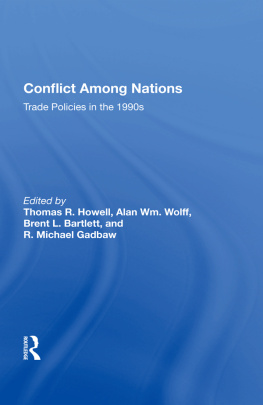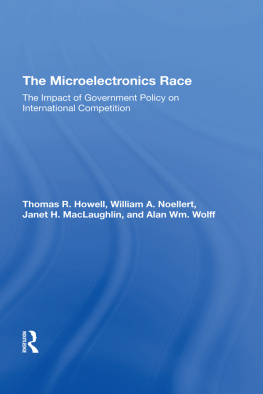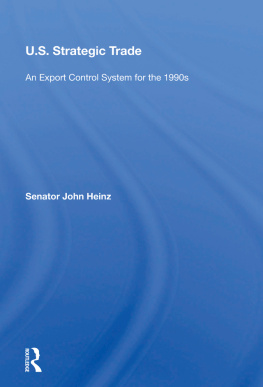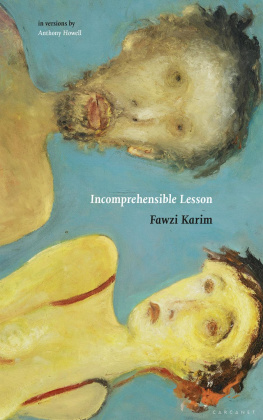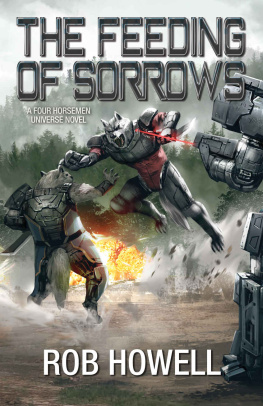Conflict Among Nations
ECONOMIC COMPETITION AMONG NATIONS SERIES
Series Editors
Alan Wm. Wolff, R. Michael Gadbaw,
Thomas R. Howell, and William A. Noeller
Dewey, Ballantine, Bushby, Palmer & Wood, Washington, D.C.
Paradoxically, in an era of growing economic interdependence, commercial and technological rivalry among nations is intensifying. International competitiveness has moved to the center of the U.S. public policy debate and has become the focus of increasing attention in Europe, Japan, and the developing world. This series examines the public policy issues that affect competition among nations and lead to international economic conflict. Its goals are to contribute to the policy debate by examining underlying sources of economic conflicts, providing policy suggestions for their resolution and fostering the knowledge that can make a more integrated world economy possible.
Titles in This Series
Conflict Among Nations: Trade Policies in the 1990s, Thomas R. Howell, Alan Wm. Wolff, Brent L. Bartlett, and R. Michael Gadbaw
Steel and the State: Government Intervention and Steels Structural Crisis, Thomas R. Howell, William A. Noellert, Jesse G. Kreier, and Alan Wm. Wolff
Intellectual Property Rights: Global Consensus, Global Conflict, R. Michael Gadbaw and Timothy J. Richards
The Microelectronics Race, Thomas R. Howell, William A. Noellert, Janet H. MacLaughlin, and Alan Wm. Wolff
First published 1992 by Westview Press
Published 2018 by Routledge
52 Vanderbilt Avenue, New York, NY 10017
2 Park Square, Milton Park, Abingdon, Oxon OX14 4RN
Routledge is an imprint of the Taylor & Francis Group, an informa business
Copyright 1992 by Taylor & Francis
All rights reserved. No part of this book may be reprinted or reproduced or utilised in any form or by any electronic, mechanical, or other means, now known or hereafter invented, including photocopying and recording, or in any information storage or retrieval system, without permission in writing fromthe publishers.
Notice:
Product or corporate names may be trademarks or registered trademarks, and are used only for identification and explanation without intent to infringe.
Library of Congress Cataloging-in-Publication Data
Conflict among nations : trade policies in the 1990s /
edited by Thomas R. Howell [et al.].
p. cm. (Economic competition among nations series)
Includes index.
ISBN 0-8133-1255-8
1. Commercial policy. 2. International trade.
I. Howell, Thomas R., 1949 . II. Series.
HF 141l.C5765 1992
382.3dc20
923846
CIP
ISBN 13: 978-0-367-00406-4 (hbk)
Contents
, Thomas R. Howell and Alan Wm. Wolff
, Alan Wm. Wolff and Thomas R. Howell
, Thomas R. Howell and Gregory I. Hume
, Brent L. Bartlett
, Thomas R. Howell and Holly Glenn
, Jesse G. Kreier
, Thorns R. Howell, Rosemary E. Gwynn, and R. Michael Gadbaw
, Alan Wm. Wolff
, Alan Wm. Wolff
, Alan Wm. Wolff
Guide
The twentieth century has been an era of relentless upheaval. In the span of three generations, mankind has moved from the era of horse-drawn transport and gas street lights to that of supersonic transport, instant global communications, and desktop computers of extraordinary power. In the political realm, we have seen the complete disappearance of the empires that governed most of the worlds territory in 1900, the emergence of over one hundred new nations, the rise and fall of vast totalitarian systems, world wars of unprecedented destructiveness, and the advent of weapons of mass destruction. The worlds population, which was still primarily rural in 1900, has undergone a massive shift into urban centers, while at the same time a green revolution has made possible the feeding of these huge, burgeoning populations by those remaining on the land.
Set against such sweeping and dramatic events, the prosaic business of making, buying, and selling commodities and services has a tendency to be overlooked -- relegated, as it were, to the business pages of the newspaper. However, economic and commercial forces have driven many of the greatest upheavals of this century and surely will play a decisive role in shaping the next. We mean this not in a Marxist sense, in terms of struggle between economic classes, but because economic strength and political power are closely correlated. The fascist regimes of the 1940s were ultimately destroyed by the superior productive power of the United States and the Soviet Union; the collapse of Soviet power was in turn a function of the vast economic and technological superiority achieved by the western democracies in the decades after World War II. International relations in the next decade, to the extent they can now be foreseen, are almost certain to be colored by intensifying contests among those democracies for commercial advantage and technological leadership.
Although the twentieth century has been dominated by dramatic confrontations between ideological blocs, it began, and now appears to be ending, with world affairs driven by a less confrontational multipolar rivalry among a handful of mercantile powers governed by forms of parliamentary democracy and utilizing capitalist systems of industrial organization. The differences between these states are cast not in black and white (e.g., democracy/totalitarianism, capitalism/communism) but in shades of gray, these shadings are significant. Perhaps reflecting that fact, the cast of players -- the major trading powers - has changed dramatically in the intervening nine decades. Some, like Japan and the United States, have moved by degrees from the periphery of the world stage to the center? others, like Britain and France, have moved aside, at least temporarily, as individual participants; still others, like Taiwan and Korea, have sprung up suddenly, seemingly from nowhere. This book is an attempt to examine the state of play currently as well as the strategies of some of the key players for advancing their economic interests over the next decade, as manifested in their trade and trade-related policies.
This has truly been Americas century, beginning with the ebullience of Theodore Roosevels presidency, continuing through successful intervention in two world wars and the shaping of the postwar world, and culminating in the triumph over communism. But in the commercial sphere, there is sufficient evidence to suggest that the U.S. experience in this century resembles a parabola, reaching its apogee around 1950 and following a downward trajectory thereafter. At this writing, the United States is the worlds largest debtor nation, has suffered a massive trade deficit for a decade, and confronts serious competitive problems across a broad array of industrial sectors. These trends cannot be ascribed to any single cause, but part of the explanation can be found in the sphere of trade policy as it is formulated and implemented both in foreign capitals and in Washington. Giving due regard to the importance of subjects such as education, industrial culture, and macroeconomic forces as elements in commercial success or failure, this book concentrates on trade policy -- how it is developed in six of the principal foreign trading entities, how it is likely to evolve in the next decade, and how its conduct by the United States could be usefully improved.
This book reflects the study and experience of a number of members of the International Trade Group of Dewey Ballantine, a group of 30 lawyers, economists, and trade specialists, headed by Alan Wm. Wolff, who provide legal, analytic, and economic services to U.S. and foreign clients. All of the editors and authors of this study are members of the Trade Group or were at the time the study was drafted, and this work draws on their collective expertise.

